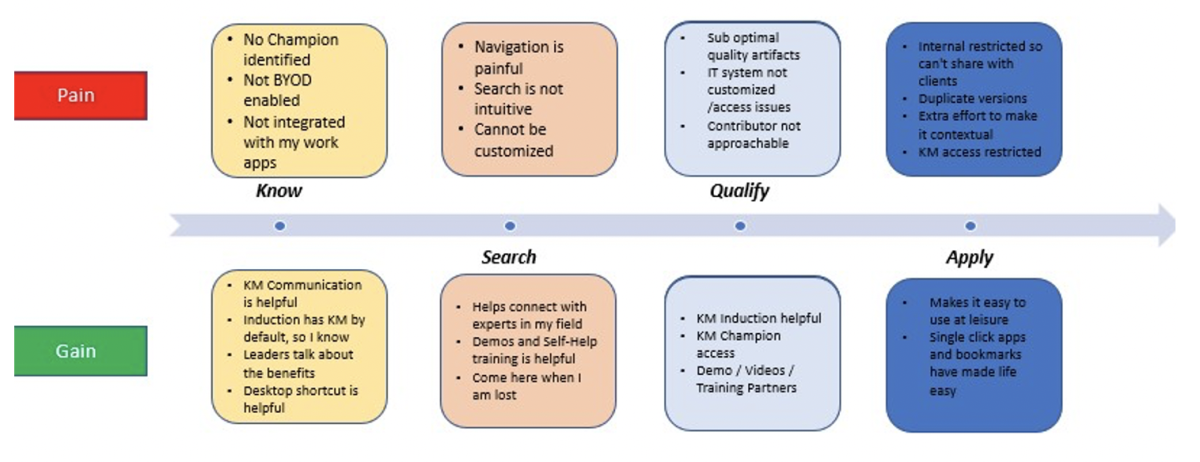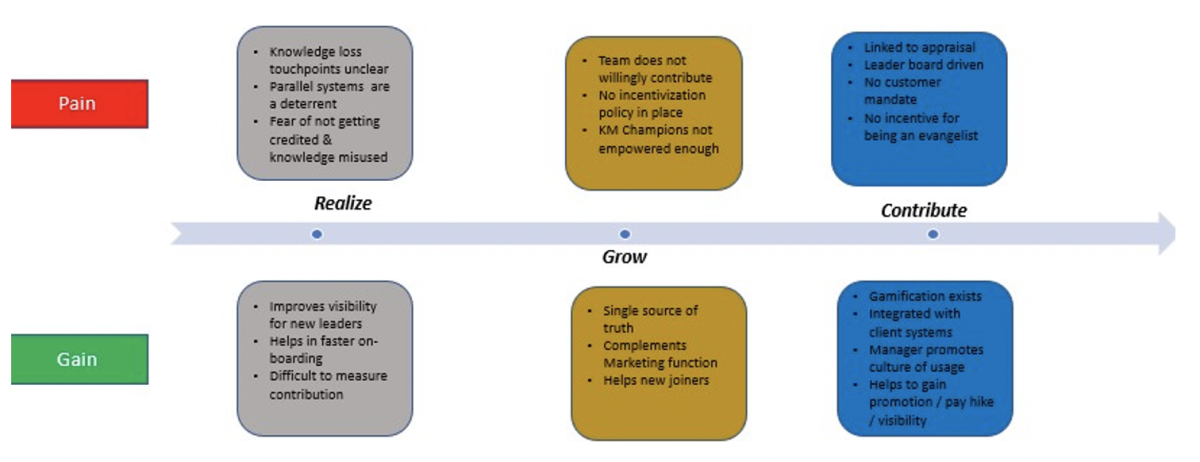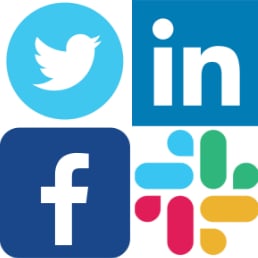...
How would you like to be a Guest Blogger for KMI? Email us at: info@kminstitute.org and let us know your topic(s)!
Fuel Your ‘Career’ Through Knowledge Management
Today the Questioning Mindset can be a barrier to advancing one's career and this impacts also in many what Knowledge Management must be offer. It can be attributed mostly to the 'users' unclear needs exploration that can be a challenge to overall adoption.
If we only limit KM to advancing a user's needs based on the remit of the organizational objectives, then possibly we are not addressing his/her 'Fears' and many-a-times 'Aspirations'. If a user for example is a Business Consultant and wants to grow into a Practice Leader in 10 years, then we need to ensure we also help him Grow feels values for his/her Contributions towards KM.
Let me introduce the 7-step framework which is a Pain-Gain Journey map that helps you understand how to advance the 'user' to becoming a believer in Knowledge Management.

1) Know: Today many leaders are focusing on enabling new-joiners to learn around the benefits of KM practices and the ready tools through the on-boarding. They are ideally introduced to a buddy who is a Champion either from their project team or at the department level and it is this person who is responsible for ensuring that the tenets of the leadership talk during the induction are translated to practices that help the person recognize KM as a part of the culture of the firm.
Larger issue that remains un-addressed is the user has his own learning-apps, personal-devices that he uses and work-apps that are not linked to the World of Organizational KM.
2) Search: Let us assume the 'user' moves ahead and has accepted the stand-alone KM system with its features and is compelled to use the system due to collaborative rule-based nature of his internal work-practices. Then in such cases we see that the user is sub-consciously accustomed to visiting KM portal when he/she is lost. They explore the expert corner; they view the self-help group channel for frequent km trainings and in-time slowly KM is becoming a part of their daily routine.
Larger issue is we are still not addressing the user's aspirational need for a personalized system that helps him get noticed at work. Most would say Gamification is the key. However, throughout my career I have seen simple things like a simple reward & recognition page for the quarterly winners being published on the intranet where a simple Like button & Comment section did the trick. It helps peers appreciate the person for the mentor they are, the team member they have always been and most importantly as a humane leader who practices the firm's values, while congratulating the person.
3) Qualify: Most of the time a CKO is chartered with measuring metrics and the focus is on ensuring the team is responsible for talking about KM in a standardized manner, so it is adopted by all. However, this leaves out the aspect of 'Fear' as today there is a rich tacit knowledge that is not so easy to codify and hence the KM team tries to address this larger issue with standard templates and contests for collecting what is available.
The larger issue at hand however is how can we ensure the expert community is initiative-taking and sees benefit in co-authoring / co-developing or co-innovating articles / IP or other differentiators that would help the user advance. Can KM ensure the user moves away from always depending on this team lead to advancing a conversation with a pool of SMEs available on a Community of Practice forum, which is credible as a source?
4) Apply: Usually as a part of a KM audit we are given a mandate to check the categories of knowledge that is most effective. Right at the top we see whitepapers, webinar content , practice asset SOPs and more such artifacts/tools as enablers. These are a clear sign that the organizational KM framework is developing,
The larger issue at hand is such artifacts also exist on client systems and there is a growing need for both clients & the organizations KM system to be unified to ensure minimal effort, better quality of output and higher usage by the community.
If we look back then we have managed to map KM by understanding the user's persona through his Fears, Aspirations and partially Skillsets. However, to advance a user and ensure he/she sees KM as a true enabler we need to also address their 'Interests' partially.

5) Realize: If you have read the Knowledge Management Toolkit by Amrut Tiwani the book talks about how a system must advance the user to know-why and ensure his knowledge orientation is aligned to exposing him/her to extensive exposure to problem solving.
However, if as leaders we only feel ecstatic that KM has been accepted and not acknowledged we fail to build the right system that is aligned to bringing in the ability to deal with unknown interactions and unseen situation. There by we remain at the know-how stage only as we fail to encourage employees to participate in the problem solving and get a feel for the issue-at-hand. It is important we are clear about the KM touchpoints, and we allow employees to get together fortnightly and share their Failures / Lessons learnt, talk about their failure moments and this improves the overall culture that it is ok to speak up.
6) Grow: While running a design thinking workshop we surveyed twenty-five leaders across various departments like Marketing, HR, Finance, Sales and few more aligned to the cohort of designing an org-wide customer portal. We intended to understand how does KM enable / impact their roles. There was a mixed consensus as the room was pivoted to design a better system based on standardizing KM templates aligned to marketing case studies, offering decks aligned to how the sales present it to clients etc.
The larger issue at hand was there was not anyone who shared that we have enabled a People Champion to talk about the need for knowledge management in not duplicating our content. Many times effective KM can come out of a conference deck, a networking dinner or a sales representative traveling to the client side.
7) Contribute: Lastly knowledge cannot be consumed unless someone creates or shares it. Having a governance policy in-place and a well-trained KM team are just enablers unless the individual is intrinsically motivated.
The larger issue at hand is how can we advance a user to promote KM and be an evangelist and along the journey help us build systems , define policies and be a true people champion.
The next time you take that all important induction remember you are advancing someone's career and hopefully this article helps you to address the user's persona-based needs rather than your structured KM approach. Who knows you might help someone turn into a believer?
Disclaimer: The article is based on my own personal views and is meant purely for sharing with encouraging readers to understand the finer aspects of design thinking that I have been exposed to during my research on designing a performance driven KM system.
About the Author: Michael Sequeira is an independent consultant who is passionate about helping organizations discover how KM can be a key differentiator for their business, teams, and clients. If you would like to learn more about his background and get-in-touch you can connect with him on LinkedIn.
Archives
- April 2024 (4)
- March 2024 (4)
- February 2024 (4)
- January 2024 (3)
- December 2023 (2)
- November 2023 (2)
- October 2023 (3)
- September 2023 (3)
- August 2023 (6)
- July 2023 (4)













